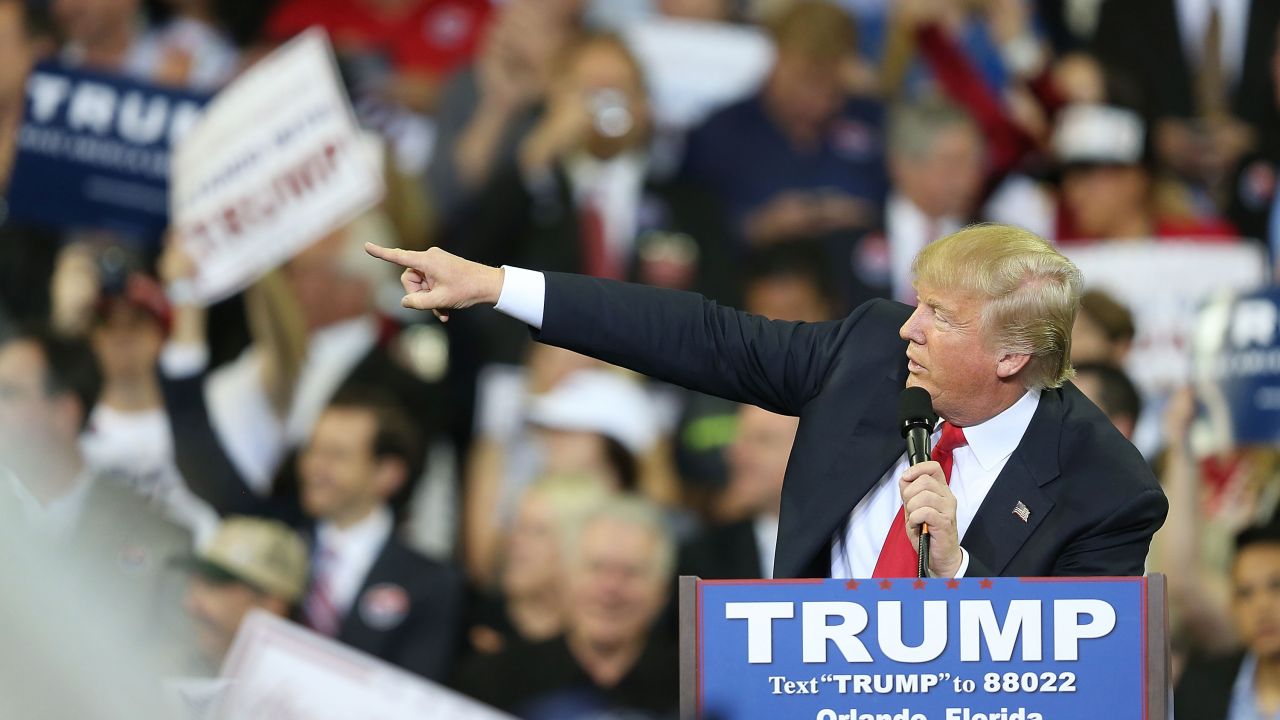
Republican presidential candidate Donald Trump speaks at the CFE Arena during a campaign stop on the campus of the University of Central Florida on March 5, 2016 in Orlando, Florida. (Photo by Joe Raedle/Getty Images)
While white supremacists have long been active in America, Republican presidential candidate Donald Trump’s statements against various racial groups seem to be further stoking their fires.
“Hate speech and the organizing of white supremacists behind this [Trump] campaign has been astounding,” said Heidi Beirich, the Southern Poverty Law Center’s (SPLC) Intelligence Project Director. “That organizing has led to more hate speech on the web.”
Throughout the primary season, Trump has built his brand on divisive language, and his reaction to the June 13 massacre at an Orlando, Florida, nightclub is no exception. On Monday, Trump suggested that all Muslim immigrants posed threats to American security, and reiterated his call for a ban on them.
— Madihha Ahussain, Muslim Advocates
Trump’s position “stokes fear and hatred of Muslims and immigrants at a time when political leaders should be bringing Americans together,” Madihha Ahussain, a lawyer at Muslim Advocates, told BillMoyers.com.
“Hateful rhetoric has real, and often violent, consequences for American Muslims, many of whom are also part of the Latino and LGBTQ communities,” she said, adding that there has been an “alarming uptick in crimes” against Muslims or those mistaken to be Muslim.
In the four months following the Paris terrorism attacks – the most recent data available – Muslim Advocates, which tracks hate crimes against the community, found 80 incidents of threats, violence and acts of vandalism targeting Muslims.
In some of these incidents, the perpetrators invoked Trump. In March, two men were allegedly attacked in Kansas — one Muslim, the other Mexican — by a man who reportedly punched them and said “Trump will take our country from you guys!” Last August, one of two brothers accused of beating a homeless Hispanic man in Boston said he was motivated by Trump’s message on immigration, police said.
Even schoolchildren are affected. A recent report from the Southern Poverty Law Center, The Trump Effect: The Impact of the Presidential Campaign on Our Nation’s Schools, found that immigrant and Muslim students in America are experiencing more bullying from their peers.
According to the report, the presidential campaign is “producing an alarming level of fear and anxiety among children of color and inflaming racial and ethnic tensions in the classroom.”
While the report’s survey of 2,000 K-12 teachers was not scientific and “did not identify any candidates,” it noted that out of 5,000 comments, “more than 1,000 mentioned Donald Trump.” Fewer than 200 contained the names Ted Cruz, Bernie Sanders or Hillary Clinton.
A Rise in Anti-Semitism Online
In recent weeks, a number of journalists who are Jewish or perceived to be Jewish have been attacked online for articles they have written or tweeted that are critical of Trump.
Many have been targeted with the (((echo))) symbol, used by white supremacists online to single out the names of Jewish people and coordinate attacks against them. “The echo symbol is the online equivalent of tagging a building with anti-Semitic graffiti or taunting someone verbally,” said Jonathan Greenblatt, CEO of the Anti-Defamation League (ADL).
After journalist Julia Ioffe’s April GQ article profiling Trump’s wife, Melania — which both she and her husband took issue with– Ioffe received upsetting calls and online abuse from Trump supporters.
Ioffe tweeted that she has received phone calls from “a blocked number that play Hitler’s speeches when I pick up.” She’s also been told she should be shot in the head, burned in an oven and has received Photoshopped images of herself in a concentration-camp uniform.
Last week, New York Times Deputy Washington Editor Jonathan Weisman quit Twitter. He received a barrage of anti-Semitic comments and Nazi iconography after linking to an anti-Trump op-ed from The Washington Post. Jeffrey Goldberg, national correspondent for The Atlantic, recently also catalogued the harassment he has received.
“This alt-right existed before the Trump campaign, but we’ve seen its growth really coincide with his candidacy,” Greenblatt told BillMoyers.com. He defines the alt-right as people on the extreme right who “promote white identity and reject mainstream conservatism.”
While Greenblatt concedes that Trump “has never endorsed the alt right as far as I know,” he called out the GOP presidential candidate for not initially disavowing the endorsement by former Ku Klux Klan Grand Wizard David Duke. Trump “didn’t initially step up and speak out against anti-Semitism with the same vigor and forcefulness that he brought to with other issues on campaign trail,” he added.
— Jonathan Greenblatt, Anti-Defamation League
Anti-Semitic online attacks against journalists covering the 2016 presidential campaign have become so widespread that the ADL announced in early June it had started a task force on racist social-media harassment of journalists. And last week, it added the (((echo))) to its database of hate symbols.
“People have had their personal information, like phone numbers, addresses and emails, exposed by these people and then it degenerates into phone calls, drive-bys and inappropriate behavior that is borderline stalking,” Greenblatt said.
Online harassment is not unique to right, he noted; it exists on the left as well: A number of female journalists have come under attack on social media from so-called “Bernie bros,” who support Sanders. The task force will examine both.
A Culture of Violence
While Trump can’t be linked directly to the actions of others, he has fomented a culture of violence at his rallies, with his “I’d like to punch him in the face” comments and the way he’s encouraged his crowds to retaliate against protesters.
The SPLC’s Beirich characterizes Trump as “playing footsie” with white supremacists – by “making racist statements that [they] would agree with and not condemning the activities they do in support of him.”
Stoking intense heat has been a hallmark of Trump’s White House bid. He barreled out of the gate at his announcement speech with statements calling Mexicans who cross the US border “rapists,” then ratcheted things up with his proposed temporary ban on Muslim migration to America, and re-tweeting a neo-Nazi’s statistics falsely claiming that blacks are overwhelmingly responsible for the murder of whites.
Trump’s trash talk makes us crave that moment when Sen. John McCain (R-AZ), in the final weeks of the 2008 presidential campaign, defended Barack Obama after jeers from his supporters calling the Democrat a “liar” and a “terrorist.” When a woman chimed in saying she heard that Obama was “an Arab,” McCain stepped in: “No, ma’am. He’s a decent family man [and] citizen that I just happen to have disagreements with on fundamental issues and that’s what this campaign’s all about. He’s not [an Arab].”
Beirich says Trump should actively distance himself from groups like the American Freedom Party (AFP), which has sponsored pro-Trump racist robocalls in a number of states, warning citizens of a “gradual genocide against the white race” through non-white immigration.
— Heidi Beirich, Southern Poverty Law Center
The closest he came, Beirich said, was saying that there has been “a database error” when William Johnson, a self-proclaimed white nationalist who heads the AFP, had been included on Trump’s California delegate slate. According to Mother Jones, other white nationalist leaders claim that members of their movement have become delegates for Trump.
“He can’t be responsible if ‘crazies’ like him, but he is responsible for saying he rejects their support, Beirich said. “And that he doesn’t do.” Against this backdrop, in 2015 the number groups on the American radical right, according to the SPLC, grew from 784 in 2014 to 892 in 2015 — a 14-percent increase.
Beirich adds that she is “absolutely shocked,” that the Republican Party is in this situation with Trump. “They should have disavowed him years ago… All this work that has been done to try to stem racism in this country has sort of been unraveled, at least among the GOP, and that has to be fixed.”




